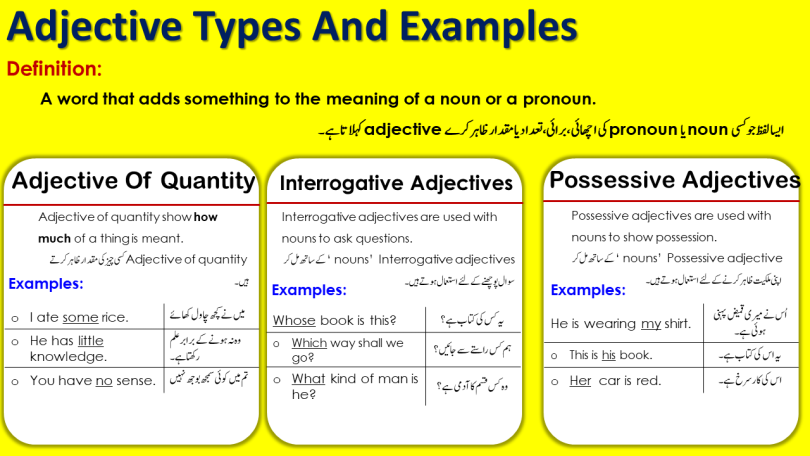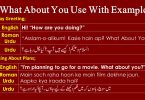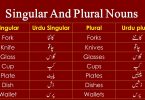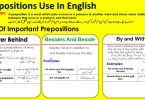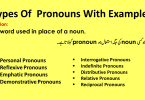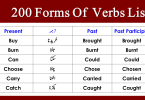Adjective With Examples
Here in this article, you are going to learn Adjective To Describe A Person With Examples. This lesson will help you to learn adjectives with many examples that are used to describe a person’s personality. As we know well English has become an international language, and without learning English you can’t survive in your practical life. So learning English is very important. That’s why in this lesson we have come up with this topic which will help you to improve your English. Just stay with us and learn this lesson, after learning this lesson you will be able to describe a person’s personality.
What Is Adjective?
Here in this section, you will learn the definition of the adjective with examples.
Definition:
A word that adds something to the meaning of a noun or a pronoun
ایسا لفظ جو کسی noun یا pronoun کی اچھائی، برائی، تعداد یا مقدار ظاہر کرے adjective کہلاتا ہے۔
Examples:
e.g. A good boy, a beautiful girl, a wise man, an old woman, dirty clothes, a large room, a small house, a heavy box
KINDS OF ADJECTIVES
Here in this section, you will learn kinds of adjectives with many examples.
-
Adjectives Of Quality Or State (Descriptive Adjectives):
Definition:
Adjectives of quality show the kind, state, or quality of a person or a thing etc
Adjective of quality کسی شخص یا چیز وغیرہ کی قسم، کیفیت، خوبی یا خامی بیان کرتے ہیں۔
Examples:
- Amjad is a good boy.
- امجد ایک اچھا لڑکا ہے۔
- Kiran is a fat girl.
- کرن ایک موٹی لڑکی ہے۔
- He is an honest man.
- وہ ایک ایماندار آدمی ہے۔
- Karachi is a large city.
- کراچی ایک بڑا شہر ہے۔
- I wore a white dress.
- میں نے سفید لباس پہنا۔
-
Adjective Of Quantity:
Definition:
Adjectives of quantity show how much of a thing is meant
Adjective of quantity کسی چیز کی مقدار ظاہر کرتے ہیں۔
Examples:
- I ate some rice.
- میں نے کچھ چاول کھائے۔
- He has little knowledge.
- وہ نہ ہونے کے برابر علم رکھتا ہے۔
- Ali has lost all his wealth.
- علی نے اپنی تمام دولت گنوا دی۔
- You have no sense.
- تم میں کوئی سمجھ بوجھ نہیں ۔
- She did not eat any fruit.
- اس نے کوئی پھل نہ کھایا۔

-
Adjective Of Number (Or Numeral Adjectives):
Definition:
Adjectives of numbers show how many persons or things are meant, or in what order a person or a thing stands.
Adjectives of number اشخاص یا چیزوں کی تعداد ظاہر کرتے ہیں یا یہ بتاتے ہیں کہ کوئی شخص یا چیز ترتیب کے لحاظ سے کس نمبر پر ہے۔
Examples:
- We have two hands to work.
- ہمارے پاس کام کرنے کے لئے دو ہاتھ ہیں۔
- There are no pictures in this book.
- اس کتاب میں کوئی تصاویر نہیں۔
- All men must die.
- تمام انسانوں نے ضرور مرنا ہے۔
- How are some ripe mangoes.
- یہاں کچھ پکے ہوئے آم ہیں۔
- Most boys like cricket.
- زیادہ تر لڑکے کرکٹ پسند کرتے ہیں۔
Note: Some adjectives can be used both for quantity and number
کچھ adjectives مقدار اور تعداد دونوں کے لئے استعمال ہوتے ہیں۔
Adjectives Of Quantity
- I ate some rice.
- He has lost all his wealth.
- You have no sense.
- She did not eat any fruit.
- I have enough sugar.
Adjectives Of Number
- Some boys are very clever.
- All men must die.
- There are no pictures in this book.
- Is there any mango tree in this garden?
- There are not enough chairs.
-
Demonstrative Adjectives:
Definition:
Demonstrative adjectives are used with nouns to point out which person or thing is meant
‘ nouns’ Demonstrative adjectives کے ساتھ مل کر کسی شخص یا چیز، واحد ہو یا جمع کی طرف اشارہ کرنے کے لئے استعمال ہوتے ہیں۔

Examples:
- This boy is stronger than you.
- یہ لڑکا تم سے زیادہ مضبوط ہے۔
- That boy is industrious.
- وہ لڑکا محنتی ہے۔
- These mangoes are sour.
- یہ آم کھٹے ہیں۔
- Those rascals must be punished.
- اُن بدمعاشوں کو ضرور سزا ملنی چاہیئے۔
-
Interrogative Adjectives:
Definition:
Interrogative adjectives are used with nouns to ask questions
‘ nouns’ Interrogative adjectivesکے ساتھ مل کر سوال پوچھنے کے لئے استعمال ہوتے ہیں۔
Examples:
- Whose book is this?
- یہ کس کی کتاب ہے؟
- Which way shall we go?
- ہم کس راستے سے جائیں؟
- What kind of man is he?
- وہ کس قسم کا آدمی ہے؟
-
Distributive Adjectives:
Definition:
Distributive adjectives are used with nouns to refer to persons or things one at a time
‘ nouns’ Distributive adjective کے ساتھ مل کر دی گئی تعداد یا مقدار میں سے ہر ایک کی طرف اشارہ کرنے کے لئے استعمال ہوتے ہیں۔
Examples:
- Each boy must do his best.
- ہر لڑکے کو اپنی پوری کوشش کرنی چاہیئے۔
- Either dress will do.
- کوئی بھی لباس چلے گا۔
- Neither statement is true.
- کوئی بھی بیان سچ نہیں۔
- Every soldier fought bravely.
- ہر سپاہی بہادری سے لڑا۔

-
Possessive Adjectives:
Definition:
Possessive adjectives are used with nouns to show possession
‘ nouns’ Possessive adjectiveکے ساتھ مل کر اپنی ملکیت ظاہر کرنے کے لئے استعمال ہوتے ہیں۔
Examples:
- He is wearing my shirt.
- اُس نے میری قمیض پہنی ہوئی ہے۔
- This is his book.
- یہ اس کی کتاب ہے۔
- Her car is red.
- اس کی کار سرخ ہے۔
DEGREES OF ADJECTIVES
Most adjectives have three degrees.
- Positive Degree:
Definition:
When the merit or demerit of a noun is described, the positive degree of an adjective is used
جب کسی noun کی کوئی خوبی یا خامی بیان کی جائے تو adjective کی positive degree استعمال کرتے ہیں۔
Examples:
Ahmad is a tall boy.
احمد ایک لمبا لڑکا ہے۔
He is an intelligent student.
وہ ایک ذہین طالب علم ہے۔
- Comparative Degree:
Definition:
When two nouns are compared with each other, the comparative degree of an adjective is used
جب دو nouns کا آپس میں موازنہ یا مقابلہ کیا جائے تو adjective کی comparative degree استعمال کرتے ہیں۔
Examples:
Ahmad is taller than Ali.
احمد علی سے زیادہ لمبا ہے۔
Tariq is wiser than Fayaz.
طارق فیاض سے زیادہ عقلمند ہے۔

- Superlative Degree:
When a noun is superior to all other nouns of its class, the superlative degree of an adjective is used
جب کسی noun کو اپنی طرح کے دوسرے تمام nouns پر فوقیت حاصل ہو تو adjective کی superlative degree استعمال کرتے ہیں۔
Examples:
Ahmad is the tallest boy in his family.
احمد اپنے خاندان میں سب سے لمبا لڑکا ہے۔
He is the most intelligent student in his class.
نوٹ: superlative degree سے پہلے عموماً the لگاتے ہیں۔

Adjectives PDF Download
Here in the last section of article you can download the PDF of this lesson.

